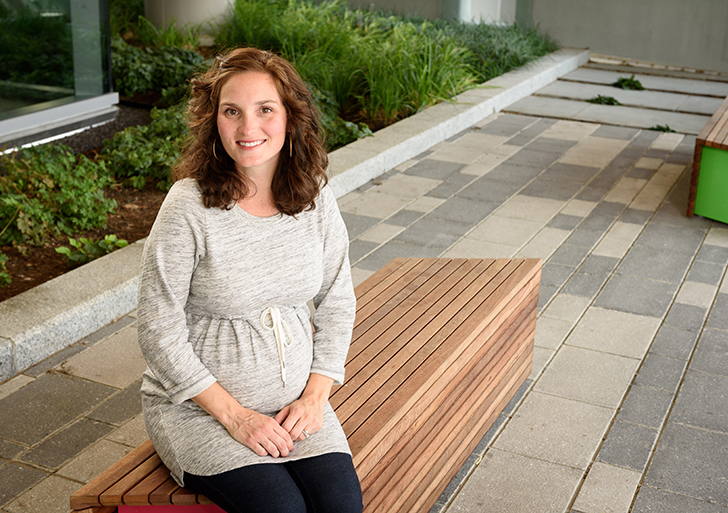
Congenital heart disease is the most common type of birth defect occurring in about one in 100 live births.
A congenital heart defect is a problem with the heart’s structure and may involve the walls of the heart, the valves of the heart and/or the arteries and veins leading to and from the heart. Defects range from conditions that show little to no visible symptoms in a child’s life to complex issues that are life-threatening.
Fortunately, today’s advanced technology allows medical professionals to identify most heart defects before a baby is born. Early detection enables the family and medical team to appropriately plan for the baby’s delivery at a hospital equipped to handle the medical complexities of heart disease and provide optimal care for both the mother and child.

Who is at risk?
While congenital heart disease can impact anyone, there are factors that increase the risk. Maternal risk factors include medical conditions such as diabetes or lupus, use of certain medications, exposure to certain viral infections and assisted reproductive technology.
Factors that would cause doctors to take a closer look at a baby in utero include suspected abnormality on screening ultrasound, abnormal prenatal screening, a first degree relative (sibling or parent) with congenital heart disease and a monochorionic twin pregnancy (identical twins sharing same placenta).
Know the questions to ask
Thorough prenatal care is essential. A complete anatomy scan ultrasound is conducted at approximately 20 weeks gestation. At this point fetal organs, including the heart, are formed and the medical team can determine if they are normal or have physical abnormalities. Ask if all four heart chambers and the blood flow in and out of the heart are normal, if the heart and stomach are in the correct position, and if the heart rate and function are normal.
Extended care for baby’s heart
If concerns are raised during a standard ultrasound or there is a maternal or fetal risk factor, the obstetrician or maternal-fetal medicine specialist may refer the family to a fetal cardiologist, who will conduct a detailed examination of the structure and function of the baby’s heart, called a fetal echocardiogram.
The ideal time to perform a fetal echocardiogram is between 18 and 22 weeks gestation, however they can be performed any time after 18 weeks. At this point the heart is completely formed and images can facilitate assessment of its structure and function, helping to identify potential issues. Newer technology is even allowing for detailed images as early as 12 weeks, although we typically want to confirm any findings at this early stage with a follow-up scan after 18 weeks.
When a heart defect is found, the fetal cardiologist will explain the diagnosis in more detail, often with an accompanying drawing. They will also coordinate both mother’s and baby’s care with physicians in other specialty areas that may include cardiothoracic surgery, critical care medicine, neonatal medicine, perinatal medicine and genetics. This team of providers will work with the family to offer education and counseling, and to develop an individualized birth plan to assure optimal care of both the mother and newborn.
Warning signs of a congenital heart defect after birth
Not all congenital heart defects are identified before a baby is born. Parents may notice warning signs in newborns such as rapid breathing, poor feeding and weight gain, or an abnormal skin or mouth color (often a blueish hue). When any of these signs are present, the child should be evaluated immediately by their pediatrician who may refer the child to a pediatric cardiologist for further assessment.
How can I prevent congenital heart disease?
Although there is no way to completely eliminate the possibility of congenital heart disease, there are several steps expectant moms can take to help reduce the risk and maximize optimal prenatal care.
- Attend all recommended prenatal visits
- Ask the physician before taking any medications
- Maintain good control of any pre-existing medical conditions
- Abstain from alcohol and drugs
- Take a prenatal vitamin as recommended by the obstetrician
- Remain up-to-date on vaccinations as recommended by the obstetrician
- Consume a healthy diet rich in calcium, copper, phosphorus and thiamine
- Avoid contact with others who are sick
Continuing these behaviors as the family grows is a great way to help everyone stay heart healthy!
Fetal cardiology
The fetal cardiology specialists at CHoR are trained to care for tiny hearts. They're part of a multidisciplinary team that cares for a child and family through every stage – from diagnosis and delivery to surgery, when necessary, and follow-up care.
